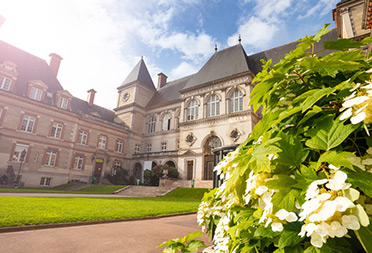The British weather has finally got the better of you and you’ve decided to take the plunge and move the family to France to live the French dream. The sun-drenched beaches of the Cote d’Azur and the snow-capped mountains of the ski resorts in the Alps await. You have a job, somewhere to live, and you’ve learnt a bit of the language. But where will the kids go to school?
Read on to find out the basics of the French education system, how it compares to the British system, and what the options are for British expats if your children’s French isn’t fluent (yet!).
How does the education system work in France?
It is compulsory for children in France to attend school between the ages of 3 and 16.
Children attend primary school (École primaire) between the ages of 3 and 11. This part of the school system includes nursery school (Maternelle), where they spend three years, between the ages of 3 and 6, and École Élémentaire, where they spend 5 years between the ages of 6 and 11. French pupils then move to Collège at the age of 11, where they spend four years, before finally transferring to Lycée for the final three years of school from the ages of 15 to 18.
Beyond the age of 18, students can choose to study at one of France’s state funded or private universities, or at privately funded higher education establishments, such as business or engineering schools or those specialising in training for specific careers, such as journalism.

What options are there for expats?
Expats moving from England have three main options. Firstly, children can join the French state education system where teaching is in French. State education is free in France, and if your children already speak French, or are young enough to learn, and you’re planning on moving to France for the long-haul, this can be a great option and your children will receive an excellent standard of education. The French state system also offers a programme specifically to help non-French speakers to integrate into the school system.
France also has French-speaking private schools. And as is the case in most European countries, many of them offer a religious element to the curriculum. Early application (up to a year in advance) is advisable as it can be very difficult to get a place.
The third option is to enrol your children into a fee-paying international school. France’s big cities, including Paris, Lyon and Nice to name a few, have an excellent selection of bilingual or foreign-language schools. Those offering a purely British curriculum (such as the British School of Paris in Croissy-sur-Seine) are fully fee paying. These can be very expensive, but may be the best option if your children are older and don’t speak French or if your stay in France is temporary.

However, many of the international bilingual schools operate ‘sous-contrat’ (under contract), meaning that they provide education in line with the French state curriculum. In addition, they offer a private element that makes up the international curriculum. This part is taught in English (or another language), and fees for these schools are much more affordable as you only pay privately for the international element. There are plenty of these bilingual schools in and around France’s larger cities, such as L’Ermitage International School in Maisons-Laffitte in the western suburbs of Paris. Children may, however, find it harder to integrate if they are older, as a good level of French is required to be able to keep up with the French side of the curriculum.
Those that are lucky enough to live close to one of France’s ‘Lycées Internationales’, such as the Lycée Internationale in Saint-Germain-en-Laye, can attend one of France’s unique, state-funded international schools. For a small financial contribution, your children can study in the British Section (or the German, Italian, Japanese, Chinese, etc., sections if they are fluent speakers and nationals of these countries) and will receive an excellent standard of education. The fees are a fraction of the price of other international options and the schools rank among France’s top state schools. However, competition for entry is fierce so it’s best to have a backup option.
What are the most surprising differences between schools in France and the UK?
- Children in French state schools don’t wear uniform. Many international schools have introduced uniforms, but don’t be surprised if the uniform is much lower key than what you’re used to in the UK.
- A key part of the French constitution is that all state institutions, including schools, are secular. The church and the state are wholly separated, meaning that there is no expression of religion in the state education system in France.
- Whilst “La Rentrée” (the date that children go back to school after the summer holidays) is in September, your September to December born child will be the oldest in the school year in the UK, but the youngest in France. This is because all of the children born in the same calendar year are in the same class together in France.
- The curriculum can be quite different in France and the UK at different stages of education. Children aged 4 or 5 in ‘Reception’ year in the UK learn to read and write, whilst children of the same age in ‘Moyenne Section’ focus more on learning through play and on the rules and norms of going to school, as well as on learning how to be independent.
- Parents may choose to put their children into a different year to the one that they should be in according to their age. Whilst this is unheard of in the UK, if your December-born child (the youngest in the year in France) is struggling to keep up with the work, particularly if they are in a French-language school, you can request for them to repeat the year. The school will usually allow this if there is good reason.

School holidays in France
For the expat in France, there are some surprises when it comes to school holidays, but once you get used to how the system works, your only worry will be to decide whether to spend your summers on the beaches of the rugged Atlantic or the French Riviera!
Find your zone!
The French “Ministère de l’Education Nationale” or Ministry for Education fixes school holiday dates each year, and each part of the country is placed into one of three zones, known as Zones A, B and C. There are many websites, such as Vacances Scolaires, with a handy map to help you to find out which zone you’re in. French state schools will all follow these dates, and most of the international schools follow suit, though do check with your school to be sure.
Holiday dates
There are five main school holidays in France, and something different happens at each.
- Vacances de la Toussaint (All Saints’ Holidays). A two-week break in October/ November, this is usually the same two-week period all over France. Traditionally, 1 November is the day to honour the dead, but Halloween on 31 October is becoming increasingly popular in France too, so it’s also the time to carve pumpkins and trick or treat!
- Vacances de Noël (Christmas Holidays). A two-week break in December/ January to celebrate the Christmas festivities and again, the dates are usually the same all over France.
- Vacances d’Hiver (Winter Holidays). A two-week break in February that is staggered across the three zones. The purpose? Skiing of course! Many families from all over France head to the Alps or the Pyrenees for a week of snow-filled fun!
- Vacances de Printemps (Spring Holidays). The final two-week break of the school year in April/ May, also staggered across the three zones. The sun is shining and many families head to the coast for a few days away, whilst older students start revising for exams!
- Pont de l’Ascension. Translated literally, the Christian holiday of Pont de l’Ascension means the Ascension “Bridge”. It is an extra-long weekend at the end of May where students get the Thursday and Friday off school. Coincidentally, “Un pont” (a bridge) is a word often used in French to describe ‘bridging’ a public holiday to a weekend. When a public holiday falls on a Thursday (or Tuesday), employees will take the Friday (or Monday) as a vacation day from work to enjoy an extra-long weekend break.
- Vacances d’Été. Ah, the long summer holidays! Usually beginning at the end of the first week in July, French children have around eight weeks of summer holidays before ‘la rentrée scolaire’ (when they go back to school) which is usually on or around 1 September. French families often holiday in France, on the west and south coasts, or in the mountains. In the larger cities of the north, particularly in Paris, it’s not uncommon for employees to take three or even four weeks off in the summer and head for the coast. Small businesses may even close throughout August.
Now you know what happens when, get your calendar, get your guidebook, and decide which part of France you’re going to head to for skiing or sunshine during the Vacances Scolaires this year!
Where can you find out more?
Children, especially younger children, are incredibly resilient and have a phenomenal ability to learn a language once immersed in the country and the culture. Your children will be fluent in French far quicker than you’ll believe (and far quicker than their parents will be!). There are plenty of options for your children’s education all over France, and in particular in France’s biggest cities.
Planning a move and need help with finding the right school for your children in France? Get in touch with AGS Movers today!


 Paris
Paris














